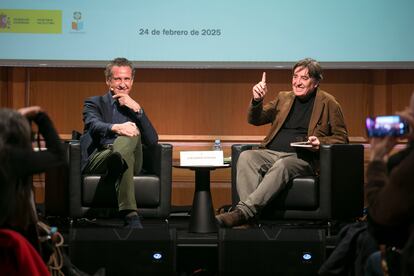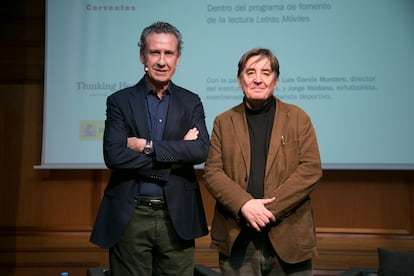García Montero: “There was a time when it was frowned upon to be an intellectual and to like football”


For Jorge Valdano , football without words is very little. “I learned about football as a child through the radio or a magazine, I didn’t see my first match until I was 16,” said the Argentine, world champion with his country in 1986. The former footballer, also a former coach, and a television commentator and writer for many years, met this Monday at the Cervantes Institute with its director, the poet, literary critic and essayist Luis García Montero. In the first event of the Letras Móviles project, a new program by Thinking Heads that tries to merge sport and literature through several well-known characters from both worlds, Valdano and García Montero explained their experiences and came to a common conclusion: football and literature are two perfectly compatible passions.
“There was a time when it was frowned upon to be intellectual and to like football,” García Montero stressed. “Literature has an experience of time, where human heritage is shared as an experience of the common good and I like football to be a team sport, where one can have a lot of quality, but if your defence fails you are putting the whole team in danger,” he related. Football, he and Valdano agreed, is also a sport of identity, in which fans develop over the years a passion that they created as children. One feels identified with the one who is on the same football team as the one with whom they share an idol. Personality is forged by playing with a ball in the street from a young age . “The street had a great advantage: it looked after the player differently,” Valdano recalled from when he himself was a child in the small town of Las Parejas, in the Argentine province of Santa Fe. “At that time, if you played football badly you were criticised. "On the street it is very easy to discover original talent, in the academy they make mediocre people better," he said.

In the history of football, they both recalled, there have been sportsmen who have combined goals and letters. A great example of this was the Brazilian Sócrates (Belém, São Paulo, 1954-2011). He was a doctor, as well as a footballer, known for this as “doctor”. Captain of Brazil, he participated in the 1982 and 1986 World Cups. An intellectual, he was a columnist, writer and politically involved with the left, author of Democracia Corintiana: a utopia em jogo , together with the journalist Ricardo Gozzi. The text was nothing more than the account of an internal democratic movement created in the Brazilian Corinthians, the club where Sócrates played between 1978 and 1984. A revolutionary way of proceeding for its time, since it coincided with the last years of the military dictatorship that fell in 1985 and gave way to democracy.
In addition to Socrates, there have been others. Pepe Mel, César Luis Menotti, Miguel Pardeza, Óscar de Marcos and Jorge Valdano himself have written books related to what is or was their passion. “The ball was my first means of livelihood and the word has been the second,” Valdano stressed. García Montero also dedicates some verses to football in his poem Domingos por la tarde, included in his book Vista cansada . For the Granada native, “football and literature are a dialogue with time,” not only because of the goal that comes in the last minute and gives people something to talk about, but because of the arguments that are generated as the days go by, like when some gave up on the Argentine team against South Korea in the group stage of the 1986 World Cup and then, the Albiceleste managed to win the title in the final against Germany. “We shouldn’t give these things too much value. They are ninety minutes in a glass of water. But they have quenched my thirst many times,” concludes García Montero in Domingos por la tarde .
EL PAÍS






